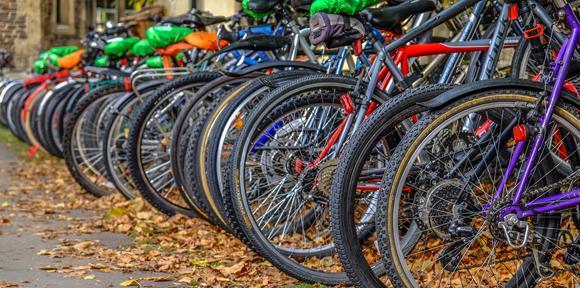
The University has published its Environmental Sustainability Report 2017, setting out its progress over the past 12 months, including key achievements and where there is room for improvement.
Every individual working or studying at the University has a role to play in taking action to reduce their environmental impact. Cambridge is strongest when we work together
Kevin Couling, Interim Head of Environment and Energy
In the foreword to the report, Vice-Chancellor Professor Stephen Toope writes: “The University of Cambridge leads the world in many fields of academic endeavour, including making essential contributions to the global journey toward a more sustainable future. In the course of carrying out our research, we should not lose sight of the fact that how we carry out our research, and all of the work that supports it, also has an environmental impact.
“Through our 2015 vision, policy and strategy, we made a commitment to achieve outstanding environmental performance and we are seeing the positive impact of our efforts in some areas; however, we also recognise that we must do more to achieve our aspirations on a range of fronts.”
The report aims to be transparent regarding our progress and recognises that we need to do more. It emphasises the role that every member of the University has in helping the institution achieve its sustainability goals.
Among some of the highlights in this year’s report are:
Transport
The performance of the Universal bus, which operates from Madingley Park & Ride to the Cambridge Biomedical Campus via the railway station, has significantly exceeded expectations: the number of University passengers is up by 73%, and user satisfaction has increased to 85%. However, the percentage of staff using sustainable modes of transport to commute to work slipped just below our 75% target this year.
Energy and Carbon
The University spent £2.9 million on energy efficiency projects last year, the highest amount so far, and its direct carbon emissions fell for the third year running. However, its indirect emissions (from sources such as air travel) increased.
Waste
Despite its overall waste volumes increasing significantly due to several large construction projects, the University’s ‘zero waste to landfill’ contract has seen the environmental impact of its waste considerably reduced. The total recycling rate for the University currently stands at 83%, a five-year high, despite a drop this year in the percentage of construction waste being recycled.
“Virtually every aspect of activity across the University has some environmental sustainability impact,” says Kevin Couling, Interim Head of Environment and Energy. “Every individual working or studying at the University has a role to play in taking action to reduce their environmental impact. Cambridge is strongest when we work together. This is why we are encouraging everyone to take part in the Cambridge Green Challenge.”
The 2016 report, produced by the Environment and Energy team at the University of Cambridge, won a Green Gown award for Sustainability Reporting, with clear reporting of key performance indicators and progress against targets.
Read the Environmental Sustainability Report 2017.
